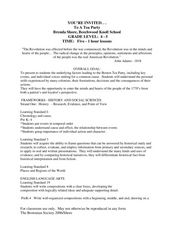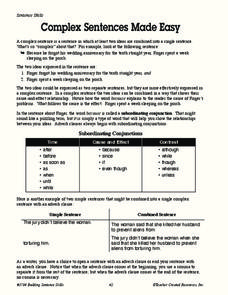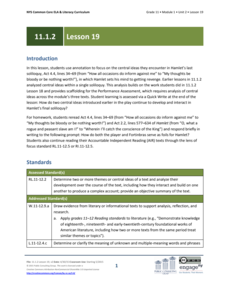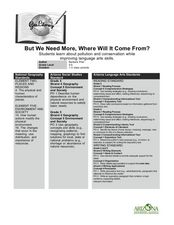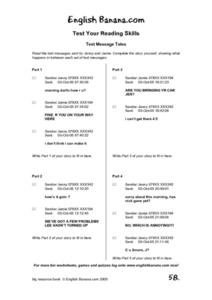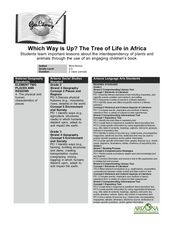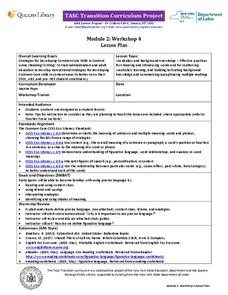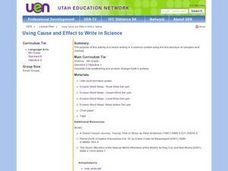Curated OER
Election of 1860
Students determine how the presidential election of 1860 led to the American Civil War. In this election of 1860 lesson, students discover details regarding the election and hold their own mock debate and election. Students also write an...
Curated OER
How to Avoid Having a Bad Day
Second graders explore cause and effect. They read Alexander and the Terrible, Horrible, No Good, Very Bad Day. They discuss their own experiences with bad days. Students identify the causes and effects in the book. They write a letter...
Curated OER
Celebrate The Four Seasons
Students investigate cause and effect and compare and contrast how recurring cycles are evident in multiple aspects of their education. They answer questions in the chosen field. Students model each aspect by interpreting, perceiving and...
Curated OER
You're Invited...To A Tea Party
Kids read the book Boston Tea Party by Steven Kroll and use maps to locate various landmarks. They identify the cause and effect of the events related to the Boston Tea Party, then write a descriptive composition.
Teacher Created Resources
Complex Sentences Made Easy
Support scholars' ability to write complex sentences with a two-page instructional activity designed to inform and reinforce. Here, learners obtain a brief overview of what a complex sentence is and how one is made; then apply their...
Curated OER
Scientific Method Experiment: Factors Affecting How Ice Melts
Students demonstrate the scientific method by conducting an ice cube melting experiment. They make predictions and observations, and conclude what factors make ice melt more slowly or quickly than normal.
Curated OER
Mesopotamia
Here is resource that offers a great, organized approach to your unit on Mesopotamia and early civilizations! As learners study the topics in the unit, such as the Fertile Crescent, ancient Sumeria, the Assyrian and Persian Empires, and...
EngageNY
Grade 11 ELA Module 1: Unit 2, Lesson 19
If revenge is a dish best-served cold, Hamlet had better get some ice. Readers discover Hamlet's plan to seek revenge. Scholars also complete a Quick Write analyzing the central ideas in Act 4.4 of Shakespeare's Hamlet.
College Board
2008 AP® Environmental Science Free-Response Questions
Some of the oiliest creatures on earth may be the answer to our energy crisis! Using a four-question assessment, resource scholars consider the use of microalgae as fuel among other environmental science topics. Each question has several...
Curated OER
What Causes Tides?
In this tides worksheet, students compare spring tides and neap tides by writing in the causes and effects of these different tides. This worksheet is a graphic organizer.
Curated OER
But We Need More, Where Will It Come From?
Students write a persuasive letter and create a poster about pollution and conservation. In this pollution and conservation lesson plan, students learn how humans are the number 1 cause of pollution.
Curated OER
The Effects of Segregation And "jim Crow" on Life in Virginia
Eighth graders study the effects that segregation and the Jim Crow laws had on life in Virginia after reviewing the Reconstruction period. They list the effects that the Jim Crow laws had on the lives of African Americans such as unfair...
Curated OER
Text Messaging Tales
In this reading and writing worksheet, students read the text messages sent between 2 friends. Students complete a 4 part story showing what happens in between each set of text messages.
Curated OER
Writing Introductions
In this writing introductions activity, students read about 4 types of introductions, then analyze 6 examples and interactively write comments about each one.
Curated OER
Which Way is Up? The Tree of Life in Africa
Students read a book titled This is the Tree about a baobab tree and draw a picture and label the tree. In this tree lesson plan, students also write a paragraph explaining why they drew that tree.
Curated OER
Conjunctions
In this grammar worksheet, students learn about conjunctions in sentence writing. They then use what they read to answer the 12 questions on the page. The answers are located on the last page of the packet.
Curated OER
It's Everyone's Home
Students research environmental destruction. In this cause and effect lesson, students students gain an understanding of everyday things we do to harm the environment. Students work in groups to create a brochure that tells the...
Curated OER
Esperanza Rising - Literature Circles and Review (Day 3)
Kids love working with their peers. Get your class into small literature circles and have them complete weekly assignments. Before beginning this week's activity, have each learner write a letter from Esperanza in California to Abuelita...
New York State Education Department
TASC Transition Curriculum: Workshop 4
Why is it important to use precise language? Participants explore this question in the fourth activity in a series of 15 on effective instruction. Perfect for all content areas, the activity promotes appropriate language choice through...
Curated OER
Essay Modes: Different Kinds of Essays
Review many different types of essays with this presentation. Each slide gives a short description of an essay such as narrative or persuasive. Makes for a good overview of various formats.
Environment Agency - Abu Dhabi
Earthquakes
What causes earthquakes? What are the effects and impacts of earthquakes? How are earthquakes measured? If there was an earthquake on Mars, would it still be considered an earthquake? Class members will find the answers to these and...
Learning for Life
Lesson 7: Stimulants
Make sure your class is aware and informed of the various types of stimulant drugs that exist. Here, they can learn their alternate names and some of their harmful effects. While this is a very basic direct-instructional instructional...
Curated OER
Using Cause and Effect to Write in Science
Fifth graders brainstorm processes or forces that cause Earth's surface to be changed.
Curated OER
The Cause & Effect Model
Students analyze the plot of the story, "The Little Engine That Could" to provide a model for writing creatively, developing critical essays, producing themes, and making predictions.



